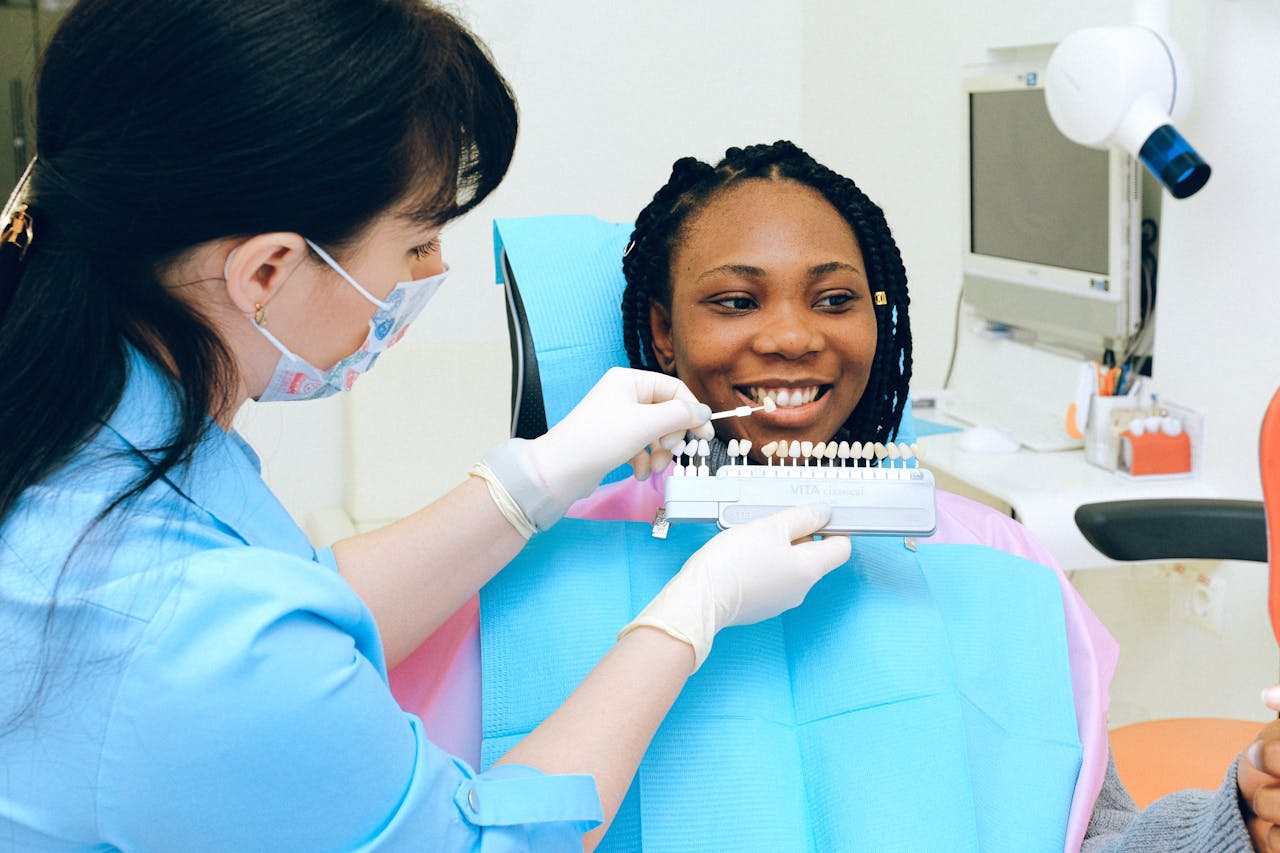Resources for dental hygienists
Success in dental hygiene requires technical and soft skills. If you’re a dental hygienist looking to stand out, honing these skills can make all the difference. This guide explores the competencies that define an exceptional dental hygienist. We’ll highlight the technical precision and interpersonal abilities needed to thrive in both temporary and permanent roles.
Feb 6, 2025
What Makes a Great Dental Hygienist
Success as a dental hygienist hinges on two distinct but equally valuable skill sets.
On the technical side, you need clinical proficiency in procedures like teeth cleaning, scaling, and operating specialized equipment. These hard skills form the foundation of patient care and treatment.
Yet just as important are the interpersonal skills that enable you to connect with patients, communicate effectively, and work seamlessly within a dental team. Balancing these strengths is what truly sets top hygienists apart.
Technical Skills
Dental hygienists must master a range of clinical procedures that form the cornerstone of preventive oral care.
At the core of these procedures is professional teeth cleaning, which involves removing plaque, tartar, and stains using both hand scalers and ultrasonic instruments.
One of the most critical procedures is Scaling and Root Planing (SRP), a deep cleaning technique that treats periodontal disease by removing deposits from above and below the gum line while smoothing tooth roots to promote healing.
Dental Equipment Expertise
Proficiency with dental equipment is foundational for delivering effective treatment. This includes knowing how to use:
Ultrasonic scalers for faster calculus removal
Hand instruments like scalers, curettes, and explorers for precise manual cleaning
Digital radiography systems for diagnostic imaging
Sterilization equipment for maintaining instrument safety
Patient Assessment and Diagnosis
Technical assessment skills are required for accurate diagnosis and treatment planning. Such assessments include:
Conducting thorough visual examinations to identify signs of periodontal disease, cavities, and other oral health issues
Using diagnostic tools like periodontal probes to measure pocket depths
Taking and interpreting digital radiographs to assess bone levels and detect underlying problems
Documenting findings accurately for treatment planning
Infection Control and Safety Protocols
Following strict infection control protocols is non-negotiable in dental practice. Such protocols include:
Implementing sterilization procedures for all instruments and equipment
Following guidelines set by the Centers for Disease Control and Prevention for infection prevention
Proper use and disposal of personal protective equipment (PPE)
Understanding and applying OSHA safety regulations
These protocols protect both patients and practitioners while maintaining compliance with regulatory requirements. This includes knowing specific sterilization temperatures and times for different instruments, understanding chemical disinfectant contact times, and maintaining proper documentation of sterilization procedures.
Soft Skills
Strong interpersonal abilities determine how effectively you connect with patients, collaborate with your team, and handle challenging situations.
Communication and Patient Education
As a dental hygienist, you need to know how to communicate clearly. You’ll need to explain complex procedures in simple terms, discuss oral health routines, and provide clear post-treatment instructions.
For instance, when demonstrating proper flossing techniques, you must adapt your communication style to each patient’s level of understanding—using visual aids for visual learners or step-by-step verbal instructions for others.
Your communication skills are especially important during patient assessments. You’ll gather medical histories, discuss concerns, and explain findings in a way that promotes patient cooperation.
Effective communication helps prevent misunderstandings about treatment plans, encourages better home care routines, and also helps you get better patient reviews.
Empathy and Patient Comfort
Dental anxiety is common among children and adults. Addressing these concerns not only improves patient experiences but also contributes to effective dental reputation management.
Your empathy and ability to create a comfortable environment can make the difference between a successful appointment and a stressful experience.
Such an approach might involve:
Taking time to listen to their concerns
Explaining procedures step by step
Offering breaks during treatment when needed
Using a gentle touch and calm voice to help them feel at ease
Team Collaboration
Success in dental hygiene requires strong teamwork skills. You’ll work closely with dentists, dental assistants, and office staff to provide comprehensive patient care. Effective collaboration leads to smooth operations and better patient outcomes, helping to boost dental office productivity.
For example, when you identify potential issues during a routine cleaning, you need to communicate these findings clearly to the dentist. This teamwork extends to coordinating with other staff, including the dental office manager, for scheduling, treatment planning, and making sure all patient needs are met promptly.
Problem-Solving and Adaptability
Every patient presents unique challenges that require quick thinking and flexibility.
You might encounter patients with limited mobility, strong gag reflexes, or special medical conditions that call for modifications to standard procedures.
Your problem-solving abilities come into play when:
Adjusting cleaning techniques for sensitive patients
Finding alternative ways to explain oral care for those who struggle with the usual instructions
Managing unexpected situations during treatments
Coordinating complex treatment schedules with multiple providers
By effectively addressing these challenges, you will provide better care and also contribute to increasing patient volume through positive word-of-mouth and patient satisfaction.
Building Your Dental Hygiene Career
Success as a dental hygienist requires you to master a comprehensive skill set that combines technical expertise with strong interpersonal abilities.
While proficiency in clinical procedures and equipment handling forms your foundation, it’s the integration of these technical skills with soft skills like communication and empathy that truly sets exceptional dental hygienists apart.
Teero understands the importance of connecting skilled dental hygienists with opportunities that allow them to thrive. As you hone your abilities, it’s also important to find the right position where you can apply your talents. Teero's platform makes it easy to discover dental hygienist jobs that match your skills and career goals, simplifying your job search process.
Download the app to get started.
